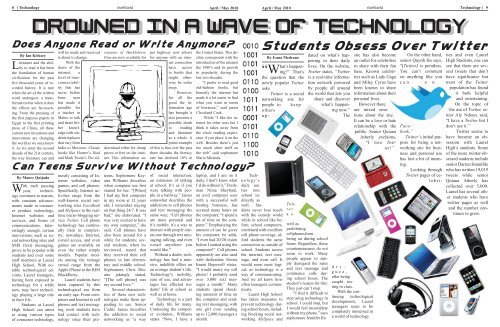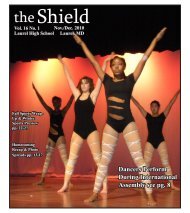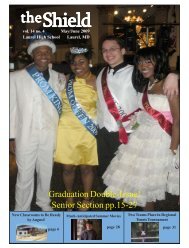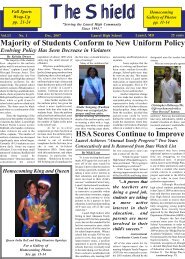Magazine-Style Front Page 1-RG.indd - Laurel High School's "The ...
Magazine-Style Front Page 1-RG.indd - Laurel High School's "The ...
Magazine-Style Front Page 1-RG.indd - Laurel High School's "The ...
Create successful ePaper yourself
Turn your PDF publications into a flip-book with our unique Google optimized e-Paper software.
8 | Technology theShield April / May 2010 April / May 2010<br />
theShield<br />
Technology | 9<br />
Drowned in a Wave of Technology<br />
TechnolOgy<br />
Does Anyone Read or Write Anymore? Students Obsess Over Twitter<br />
By Ian Kirksey<br />
Literature and the ability<br />
to read it has been<br />
the foundation of human<br />
civilization for the past<br />
fi ve thousand years of recorded<br />
history. It is rare<br />
when the art of the written<br />
word undergoes a transformation<br />
but when it does<br />
the effects are far-reaching.<br />
From the pressing of<br />
the fi rst papyrus papers in<br />
Egypt to the fi rst printing<br />
press of China, all these<br />
current new inventions and<br />
innovations are changing<br />
the world as we once knew<br />
it. As we enter the second<br />
decade of the 21st century,<br />
the way literature can and<br />
Can Teens Survive Without Technology?<br />
By Maury Quijada<br />
With each passing<br />
year, technology<br />
continues to mature,<br />
with constant advancements<br />
made in consumer<br />
product technology,<br />
Internet websites and<br />
services, and forms of<br />
communications. Interestingly<br />
enough, certain<br />
innovations, such as social<br />
networking sites and<br />
SMS (text) messaging,<br />
prove to be popular with<br />
students and even some<br />
staff members at <strong>Laurel</strong><br />
<strong>High</strong> School. With notable<br />
technological advents,<br />
<strong>Laurel</strong> teenagers,<br />
having been exposed to<br />
technology for a while<br />
now, may have technology<br />
playing a large role<br />
in their life.<br />
Students at <strong>Laurel</strong><br />
<strong>High</strong> School can attest<br />
to using various types<br />
of consumer technology,<br />
will be made and received<br />
is about to change.<br />
With the<br />
dawn of the<br />
internet, a<br />
level of interconnectability<br />
that has<br />
never before<br />
been seen<br />
has made it<br />
possible for<br />
a teacher in<br />
Maine to talk<br />
and share his/<br />
her knowledge<br />
with students<br />
in places<br />
that vary from<br />
India to Morocco. Classic<br />
books like Homer’s Iliad<br />
and Mark Twain’s <strong>The</strong> Ad-<br />
mostly consisting of Internet<br />
websites, video<br />
games, and cell phones.<br />
Specifi cally, Internet activities<br />
range from the<br />
well-known social networking<br />
sites FaceBook<br />
and MySpace to the realtime<br />
micro-blogging service<br />
Twitter. Cell phone<br />
technology has continually<br />
risen in complexity;<br />
nowadays, Internet,<br />
e-mail access, and even<br />
games are available on<br />
even the rather simple<br />
models. Popular models<br />
among the teenage<br />
crowd range from the<br />
Apple iPhone to the RIM<br />
BlackBerry.<br />
<strong>Laurel</strong> students have<br />
been captured by this<br />
technological era from<br />
an early age. From computers<br />
and Internet to cell<br />
phones and text messaging,<br />
most students have<br />
had contact with technology<br />
since their pre-<br />
ventures of Huckleberry<br />
Finn are now available for<br />
download either for cheap<br />
prices or free on the internet.<br />
This information su-<br />
teens. Sophomore Keyaira<br />
Williams describes<br />
when computer use fi rst<br />
started for her. “[When]<br />
I had my fi rst computer<br />
in my room at 12 years<br />
old, I remember staying<br />
on that thing 24/7. It was<br />
bad,” she elaborated. “I<br />
was very excited to have<br />
my own computer,” she<br />
said. Cell phones have<br />
also been around for a<br />
while for students; several<br />
students, when interviewed,<br />
stated that<br />
they received their cell<br />
phones in late elementary<br />
and middle school.<br />
Sophomore Chris Dinarte<br />
jokingly stated,<br />
“[<strong>The</strong> cell phone] was<br />
my second love.”<br />
Several characteristics<br />
of these new technologies<br />
make them appealing<br />
to use. Senior<br />
Cedric James describes<br />
the addiction to social<br />
networking as “a way<br />
per highway now allows<br />
for anyone with an internet<br />
connection<br />
have access<br />
to books that<br />
might otherwise<br />
be miles<br />
away.<br />
However,<br />
for all the<br />
good the information<br />
age<br />
has brought it<br />
also presents a<br />
possible death<br />
to reading<br />
and literature<br />
as a whole. A<br />
prime example<br />
of this is that over the past<br />
three decades the literacy<br />
rate has declined 10% in<br />
of social interaction;<br />
an extension of talking<br />
at school. It’s as if you<br />
were talking with people<br />
in a hallway.” James<br />
somewhat describes the<br />
addictions to cell phones<br />
and text messaging the<br />
same way; “Cell phones<br />
are more personal and<br />
it’s mobile; it’s a way to<br />
interact with people oneon-one<br />
through text messaging,<br />
talking, and even<br />
e-mail anywhere you<br />
would like.”<br />
Without a doubt, technology<br />
has had a massive,<br />
indelible effect on<br />
an average student’s life.<br />
Technology’s mobility,<br />
ease of use, and advantages<br />
has affected students’<br />
life at school as<br />
well as at home.<br />
Technology is a part<br />
of daily life for many.<br />
Continuing the computer<br />
evolution, Williams<br />
states “Now, I have a<br />
the United States. This decline<br />
corresponds with the<br />
introduction of the internet<br />
the 1980’s and its growth<br />
in popularity during the<br />
last two decades.<br />
“I prefer to read good<br />
old-fashion books, but<br />
honestly the internet has<br />
made it a lot easier to fi nd<br />
what you want in terms<br />
of literature,” said junior<br />
Cleveland Cook.<br />
While “I like the internet<br />
for other uses but I<br />
think it takes away from<br />
the whole reading experience<br />
if you place it on the<br />
web. Besides there’s just<br />
too much other stuff on<br />
the web” said sophomore<br />
Mario Miranda.<br />
laptop, and I am on it<br />
daily. I don’t know what<br />
I’d do without it,” Freshman<br />
Nima Sheybani,<br />
an avid computer user<br />
with a successful web<br />
hosting business, has<br />
accrued many hours on<br />
the computer; “I spend a<br />
lot of time on the computer.”<br />
Emphasizing the<br />
amount of use he gives<br />
his computer, he adds,<br />
“I even had 20/20 vision<br />
before I started using the<br />
computer!” Cell phones<br />
apparently are also used<br />
with dedication; Senior<br />
Imani Hopewell states,<br />
“I would marry my cell<br />
phone! I probably send<br />
over 3,000 text messages<br />
a month.” Many<br />
students spend shocking<br />
amounts of time on<br />
the computer and sending<br />
text messaging, with<br />
one girl even sending<br />
up to 12,000 messages a<br />
month.<br />
By Ivana Medrano<br />
“W<br />
hat’s happening?”<br />
That’s<br />
the question that the<br />
newly popular Twitter<br />
asks.<br />
Twitter is a social<br />
networking site for<br />
people to<br />
others<br />
up-<br />
keep<br />
Technology’s<br />
daily use<br />
ties into<br />
school indirectly<br />
as<br />
well. Students<br />
never lose touch<br />
with the outside world<br />
while in school like before;<br />
school computers,<br />
combined with excellent<br />
cell phone coverage, afford<br />
students the same<br />
connection as outside of<br />
school. Students access<br />
the internet, text message,<br />
and even call. It<br />
would seem most logical,<br />
as technology is a<br />
way of communicating.<br />
And we all know how<br />
often teenagers communicate.<br />
<strong>Laurel</strong> <strong>High</strong> School<br />
has taken measures to<br />
prevent technology during<br />
school hours, including<br />
blocking social networking<br />
MySpace and<br />
Twitter<br />
a s<br />
well as<br />
prohibiting<br />
cellphones from<br />
being on during school<br />
hours. Regardless, these<br />
countermeasures do not<br />
seem to work. Many<br />
people appear to simply<br />
disregard the rules<br />
and text message and<br />
commence calls during<br />
school hours. <strong>The</strong><br />
student’s reason for this:<br />
<strong>The</strong>y just can’t stop.<br />
“I fi nd it diffi cult to<br />
stop using technology in<br />
school. I could stop, but<br />
I would feel incomplete<br />
without my phone,” says<br />
sophomore Jennifer Ro<br />
dated on what’s happening<br />
in their daily<br />
lives. On the website,<br />
Twitter states, “Twitter<br />
is a real-time information<br />
network powered<br />
by people all around<br />
the world that lets you<br />
share and discover<br />
what’s happening<br />
now.”<br />
<strong>The</strong><br />
d r i -<br />
guez,<br />
after being<br />
caught texting<br />
in class.<br />
With the continuing<br />
technological<br />
developments, <strong>Laurel</strong><br />
teenagers seem to be<br />
completely immersed in<br />
a world of technology.<br />
site has also become<br />
an outlet for celebrities<br />
to share with their fan<br />
base. Known celebrities<br />
such as Lady Gaga<br />
and Miley Cyrus have<br />
been known to share<br />
information about their<br />
personal lives.<br />
However there<br />
are mixed emotions<br />
about the site.<br />
It can be a love or hate<br />
relationship with the<br />
public. Senior Quiana<br />
Atherly exclaims,<br />
“I love Twitter!”<br />
On the other hand,<br />
senior Quynh Ha says,<br />
“[Twitter] is pointless.<br />
You can’t comment<br />
on anything like you<br />
can o n<br />
Facebook.”<br />
Twitter’s initial purpose<br />
for being a networking<br />
site for business<br />
and personal use<br />
has lost a bit of meaning.<br />
Looking through<br />
Twitter pages of celebri-<br />
ties and even <strong>Laurel</strong><br />
<strong>High</strong> Students, one can<br />
see that there are several<br />
tweets that don’t<br />
have signifi cance but<br />
most of the Twitter<br />
population has found<br />
it both helpful<br />
and entertaining.<br />
On the topic of<br />
the use of Twitter, senior<br />
Aly Ndiaye said,<br />
“I have a Twitter but I<br />
don’t use it.”<br />
Twitter seems to<br />
have become an obsession<br />
with <strong>Laurel</strong><br />
<strong>High</strong>’s students. Some<br />
of the more twitter-obsessed<br />
students include<br />
senior Darren Hannible<br />
who has written 19,019<br />
tweets while senior<br />
Quiana Atherly has<br />
collected over 5,000.<br />
<strong>Laurel</strong> has several other<br />
students who have<br />
twitter pages as well<br />
and the number continues<br />
to grow.









